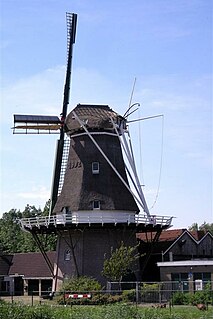Related Research Articles

De Achlumer Molen is a smock mill in Achlum, Friesland, Netherlands which has been restored to working order. The mill is listed as a Rijksmonument, number 15821.

The Grutte Mûne is a smock mill in Broeksterwâld, Friesland, Netherlands which has been restored to working order. The mill is listed as a Rijksmonument, number 11679.

Aylvapoldermolen is a smock mill in Burgwerd, Friesland, Netherlands which has been restored to working order. The mill is listed as a Rijksmonument, number 15626.

Windlust is a smock mill in Burum, Friesland, Netherlands which was built in 2014, replacing an earlier mill that had burnt down on 8 April 2012.

De Rat is a smock mill in IJlst, Friesland, Netherlands, which was originally built in the seventeenth century at Zaanstreek, North Holland. In 1828 it was moved to IJlst, where it worked using wind power until 1920 and then by electric motor until 1950. The mill was bought by the town of IJlst in 1956 and restored in the mid-1960s. Further restoration in the mid-1970s returned the mill to full working order. De Rat is working for trade and is used as a training mill. The mill is listed as a Rijksmonument.

De Volharding is a smock mill in Jislum, Friesland, Netherlands which was built in 1872. The mill has been restored to working order and designated as being held in reserve in times of emergency. It is listed as a Rijksmonument, number 15632.

Penninga's Molen or De Jonge Wester is a smock mill in Joure, Friesland, Netherlands which was built in 1900 and is working for trade. It is also used as a training mill. The mill is listed as a Rijksmonument, number 20842.

De Vlijt or Molen 't Op is a post mill in Koudum, Friesland, Netherlands which was built in 1986 and is working in working order. The mill is listed as a Rijksmonument, number 34081.

De Bullemolen English: The Executioner's Mill is a smock mill in Lekkum, Friesland, Netherlands which was built in 1825. The mill has been restored to working order and is listed as a Rijksmonument, number 24505.

De Phenix is a smock mill in Marrum, Friesland, Netherlands which was built in 1917. The mill has been restored to working order and is used to train millers. It is listed as a Rijksmonument, number 15602.

De Hoop is a smock mill in Stiens, Friesland, Netherlands which was rebuilt in 1993 after the earlier mill burned down. It is operational and manned by volunteers.

Wijnsermolen is a smock mill in Wyns, Friesland, Netherlands which is currently (2011) being restored to working order. The mill is listed as a Rijksmonument, number 35691.

The Terpensmole is a drainage mill in IJlst, Friesland, Netherlands. It was moved from its earlier location in Sneek in 2011 where it was known as the Himmole. The mill is listed as a Rijksmonument, number 22914. It is fully functional and can be used to help drain the adjacent polder.
The Stichting De Fryske Mole is a foundation for the preservation of windmills in the Dutch province Friesland, owning 42 of the 124 windmills in Friesland and closely co-operating with the Gild Fryske Mounders with which it publishes a quarterly magazine, De Utskoat. The Stichting De Fryske Mole was founded in December 1970 to preserve those mills that were otherwise difficult to save. Consequently, all of the foundation's mills are drainage mills often standing in remote locations where there are no other parties interested in or able to pay for restoration and maintenance.

The Geeuwpoldermolen is a drainage mill near the twin village of Oppenhuizen, Friesland, Netherlands. It is a hollow post windmill of the type called spinnenkop by the Dutch. The mill is listed as a Rijksmonument, number 39810 and it is still in use for draining the Geeuwpolder. It was almost completely renewed at a restoration in 1987, earlier restorations were in 1954 and 1965.
A Tjasker is a type of small drainage windmill used in the Netherlands. There are thirteen tjaskers remaining in Friesland.
The Gilde van Vrijwillige Molenaars is a Dutch society of volunteer millers who operate many of the Dutch wind- and watermills. The main goal of the society is to help with the preservation of Dutch windmills by training new millers to run wind- and watermills on a voluntary basis.

De Schalsumermolen is a smock mill in Schalsum, Friesland, Netherlands which was built in 1801. The mill has been restored to working order. Used as a training mill, it is listed as a Rijksmonument.

Boezemmolen is a smock mill in Tijnje, Friesland, Netherlands which was built in 1856 and dismantled in 1911. Formerly converted to residential use, the mill is under restoration. It is listed as a Rijksmonument.
References
- ↑ Vereniging Gild Fryske Mounders. Statuten.
- ↑ "Gebrek aan geld legt restauratie Friese molens aan banden". Leeuwarder Courant. 1974-09-26.
- ↑ "Samenwerking tussen molenaarsgildes vrijwel zeker van de baan". Leeuwarder Courant. November 7, 1981.
- ↑ "Gilde haalt 150-ste molenaar binnen". Leeuwarder Courant. 1994-01-31.
- ↑ "Vrijwillige molenaars stappen bijelkaar". Leeuwarder Courant. October 4, 1997.
- ↑ "Examen splijt eenheid gilde molenaars". Leeuwarder Courant. 2003-02-22.
- ↑ "Tweespalt in de wind". Leeuwarder Courant. May 6, 2003.
- ↑ "Opleiding". Gild Fryske Mounders. Archived from the original on 2011-12-19.